While we seem to want soldiers on short-term engagement, warfare itself is getting more technical and needs skilled manpower.
The world has seen the dismal performance of armies that rely on short tour of duty soldiers or have outsourced war to 'contractors' in Afghanistan and now in Ukraine, points out Colonel Anil A Athale (retd).
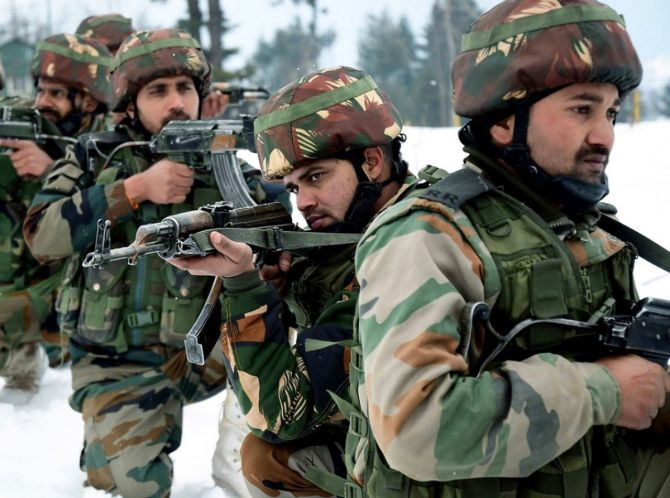
Recent leaks in the media talk about a 'new' recruitment policy for the military.
The main aim appears to be to reduce the pension burden and make more funds available for modernisation.
An added advantage sought is to keep the armed forces young. Both indeed are laudable goals.
The armed forces are the ultimate insurance for a nation in a turbulent world where there is a plethora of internal and external threats to a nation's existence.
It is also a truism that the insurance burden should not be so high that it bankrupts the country.

The efficiency and effectiveness of an armed force depend on an appropriate man-machine mix, moral, motivation and unit level cohesion (also variously called espirit de corps/brotherhood/comradeship).
A reform like the proposed one has the potential to lead to certain fundamental and intangible changes in the military sociology, unit-level cohesion and ultimately effectiveness of the armed forces.
These kinds of reforms ought to be done after multi-disciplinary studies and wide-ranging debates and discussions and not be based on a single criterion like reduction of expenditure alone.
We have before us the example of 'cadre review' for officers that while enhancing the financial prospects of the servicemen led to armed forces accumulating dead wood and dilution of ranks.
Recruitment changes are not national secrets like potential nuclear targets or location and the tasks of strategic forces that need to be kept secret.
Decisions of this nature ought to be discussed in parliamentary committees and debated in multiple fora. This is the essence and strength of democracy.
Limited service period and limited liabilities towards soldiers is not a new concept.
We had right up to the 1970s concept of seven years colour service and reserve liability system.
It is the breakneck expansion post-1962 (when the armed forces doubled) that this concept was jettisoned.
As a young officer of 1960s vintage one remembers reservists coming in for a limited period and being employed on langar duties mostly.
Before we embrace a new 'avatar' of the same system, it is necessary to study the available evidence about the decision to do away with the older system in the first place.
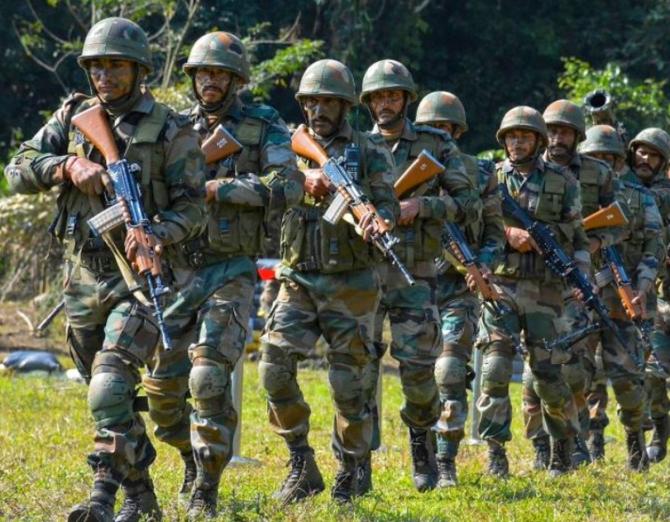
As per the news leaks, the plan appears to be to recruit a person for 4 years' service (why 4 and not 7 as earlier?).
One can speculate the 4-year period has been zeroed on keeping in view the possible future judicial challenge of a claim for a permanent job after 5 years of unbroken service.
Hence, also the 6 months break in service. Without beating round the bush, it is a kind of 'contract' labour, part of which will be made permanent.
There are several questions that arise.
What happens to such soldiers who get wounded or killed during this contract?
Is this measure going to be applicable for skilled technicians like aircraft repairmen or submariners of navy?
Or is it only for the 'unskilled' infantrymen?!
What will be the impact of such trained manpower getting thrown to the streets on internal security situations?
Will these trained soldiers be given preference in recruitment to police and paramilitary forces? These and many questions are unanswered.
While we seem to want soldiers on short-term engagement, warfare itself is getting more technical and needs skilled manpower.
The world has seen the dismal performance of armies that rely on a short tour of duty soldiers or have outsourced war to 'contractors' in Afghanistan and now in Ukraine.

To achieve the goals of reducing expenditure, is there a scope to slowly reduce manpower and make the armed forces technology-intensive?
At the officer level, this experiment was carried out in the shape of Short Service Commissions.
It is necessary to carry out a study of the impact of this measure on the efficiency and financial benefits that accrued to the services.
To the best of knowledge, such studies do not seem to exist.
As a final question mark, what will be the motivation level of such a 'temporary' soldier?
Historically, the 1919 unrest in Punjab during the British rule was directly linked to the post-World War I de-mobilisation of soldiers.
It is also a recorded fact that the 1980s militancy in Punjab had a large number of ex-servicemen who had retired at lower ranks and were surviving on meagre pension.
In the US where the tour of duty concept originates, many ex-soldiers live as homeless people on the streets.
A large proportion has also taken to a career in crime. These are sobering indicators. One wonders if these have been thought through.

Along with this 'tour of duty' change, there is a move to do away with regional and caste-based regimental system and have an all India mix at unit level.
Let me give an example of the infantry.
At the unit level where there is a degree of homogeneity say a Maratha Regiment... Chhatrapati Shivaji Ki Jai is the war cry and is often invoked to motivate soldiers. Similarly, a Sikh Regiment soldier is motivated by a war cry of 'Bole So Nihal, Sat Sri Akal'.
Imagine a unit where at the basic level we have say Sikh, Maratha and Gorkha soldiers present together.
Is there an equivalent motivator to the Sikh Gurus or Chhatrapati Shivaji? It is not for nothing that many efficient armies like the British army still have their Scottish Cold Stream Guard regiments where the men take pride in their history of valour.
To throw away such a valuable asset for the sake of some mythical 'unity' (uniformity in actual fact) is nothing short of disastrous.
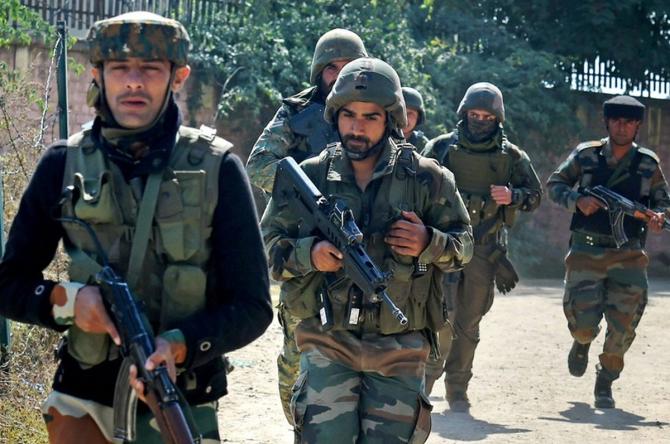
It is intriguing as to why the central paramilitary forces have been left out in this reform zeal. Many of the woes of excess manpower costs could be mitigated if a comprehensive review of national security is carried out that includes the asset of paramilitary forces and integrates them into the overall security plans of the country.
It is suggested that before such a far-reaching reforms is implemented a study be carried of the whole gamut of issues by a blue-ribbon panel that should be bi-partisan and must comprise sociologists, bi-partisan politicians with experience in national security, military historians and recently retired soldiers.
These study reports should be then widely debated and the optimum solution arrived at.
Stepping out of line, one could suggest Captain Amarinder Singh (retd) to head such a panel. As a former chief minuster of a border state, a former soldier and a student of military history, Captain Singh is eminently suited to carry out this onerous task.
Till the time this panel carries out its study, the heavens will not fall if the current move is held in abeyance for some time.
But if the government is indeed hell-bent on implementing its policy, then ideally, if the short-term soldiers are subsequently absorbed in the police/paramilitary forces, it would be a win-win for all. This alone will mitigate some of the possible adverse effects on morale and motivation.
Feature Presentation: Rajesh Alva/Rediff.com
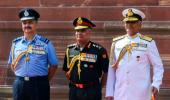

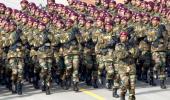








 © 2025
© 2025